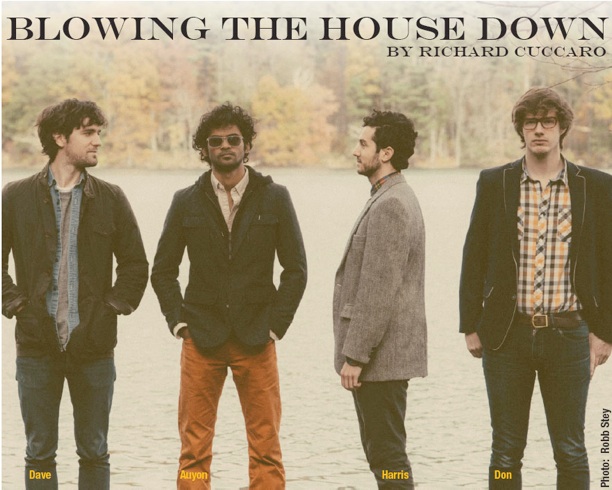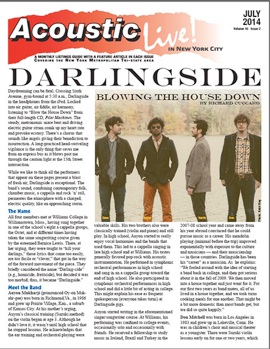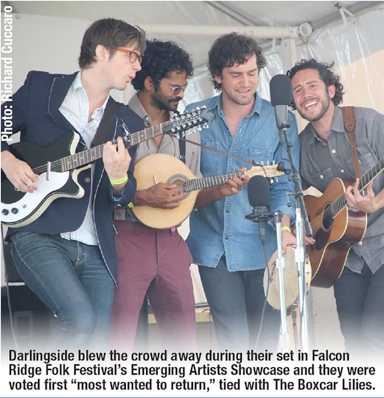Darlingside
Daydreaming can be fatal. Crossing Sixth Avenue, gym-bound at 5:30 a.m., Darlingside in the headphones from the iPod. Locked into air guitar, air fiddle, air harmony, listening to “Blow the House Down” from their full-length CD, Pilot Machines. The steady, metronomic snare beat and driving electric guitar strum crank up my heart rate and provoke ecstasy. There’s a chorus that sounds like angels giving their benediction to insurrection. A long-practiced head-swiveling vigilance is the only thing that saves me from an express bus as it blows past me through the caution light at the 15th Street intersection.
While we like to think all the performers that appear on these pages present a blast of fresh air, Darlingside is exceptional. The band’s sound, combining contemporary folk, chamber music, a cappella and rock ’n’ roll, permeates the atmosphere with a charged, electric quality, like an approaching storm.
The Name
All four members met at Williams College in Williamstown, Mass., having sung together in one of the school’s eight a cappella groups, the Octet, and at different times having taken the same songwriting course given by the esteemed Bernice Lewis. There, at her urging, they were taught to “kill your darlings,” those lyrics that come too easily, are too facile or “clever,” that get in the way of the forward movement of the piece. They briefly considered the name “Darling-cide” (e.g., homicide, fratricide), but decided it was too morbid; thus, it became “Darlingside.”
Meet the Band
Auyon Mukharji (pronounced Oy-on Muk-ahr-gee) was born in Richmond,Va., in 1986 and grew up Prairie Village, Kan., a suburb of Kansas City. At his mother’s urging, Auyon’s classical training (Suzuki method) on the violin began at age 3. Although he didn’t love it, it wasn’t until high school that he stopped lessons. He acknowledges that the ear training and orchestral playing were valuable skills. His two brothers also were classically trained (violin and piano) and still play. In high school, Auyon started to really enjoy vocal harmonies and the bands that used them. This led to a cappella singing in late high school and at Williams. His tastes generally favored pop-rock with acoustic instrumentation. He performed in symphonic orchestral performances in high school and sang in an a cappella group toward the end of high school. He also participated in symphonic orchestral performances in high school and did a little bit of acting in college. This might explain his ease as frequent spokesperson (everyone takes turns) at Darlingside gigs.
Auyon started writing in the aforementioned singer/songwriter course. At Williams, his performing was confined to college events, occasionally solo and occasionally with friends. He received a fellowship to study music in Ireland, Brazil and Turkey in the 2007-08 school year and came away from his year abroad convinced that he could pursue music as a career. His mandolin playing (minimal before the trip) improved exponentially with exposure to the culture and musicians — and their musicianship — in those countries. Darlingside has been his “career” as a musician. As he explains: “We fooled around with the idea of starting a band back in college, and then got serious about it in the fall of 2009. We then moved into a house together and just went for it. For our first two years as band mates, all of us lived in a house together, and we took turns cooking meals for one another. That might be a bit more domestic than most bands get, but we did so quite happily.”
Don Mitchell was born in Los Angeles in 1983 and grew up in Lakeville, Conn. He was in children’s choir and musical theater as a youngster. There were Suzuki violin lessons early on for one or two years, which never took hold, and a few starter lessons in guitar at 13 to 14 years old. Don credits performing with Chorus Angelicus, a touring children’s choir not connected with school, as his most intense and formative early experience. He had his first guitar/voice performance at his eighth grade graduation ceremony. As a teenager, Don would “hole up” in the basement with his guitar. While in high school, he took classes in music and performed in chorus, assemblies, plays and concerts. He initially preferred bands like Green Day, Rage Against the Machine and Phish, but later narrowed his focus to pop/rock with “big melodic content,” harmonies and folk instrumentation.
Don began performing at open mics at the boarding school he attended for high school and wrote songs with his roommate (remarkably, the song “Drowning Elvis” had its inception here). They’d occasionally put together a bigger group to play events on campus. As stated, he crossed paths with the other band members at Williams.
Harris Paseltiner was born in Evanston, Ill., and grew up in nearby Glencoe, north of Chicago, near Lake Michigan. Harris good-naturedly said that, counter to most stories we hear, he ran off the soccer field in kindergarten yelling, “Dad, can I take violin lessons?” His entire family — parents, a brother and a sister — were all music lovers. They’d clear the living room furniture and have dance parties. Harris started playing classical cello at age 6 and continued until he went to college. He played in numerous orchestras and his main interest was chamber music (he started in earnest at age 10), specifically piano trios (piano, violin and cello).
His study regimen was pretty dense. As he describes it: “I used to go to school early to play in a chamber orchestra, and then had a period of symphony orchestra each day. Then after school it was solo practice, lessons and chamber music rehearsals and musicianship classes and recitals on the weekends.” He picked up the guitar in high school and began experimenting with songwriting.
With once-a-week cello recitals starting at age 6, Harris developed a stage presence early. There was no stage fright issue getting up to play original songs with guitar at open mics in high school. When he got to Williams College, he started playing out at coffeehouse nights. Later, when he lived in Oxford, England, he busked on street corners and played in pubs.
Dave Senft was born in Connecticut in 1985 and grew up in Bedford, N.Y. Both of his parents are musically inclined. There was lots of singing at family gatherings, especially on his mother’s side. Early on, he was drawn to the music in Disney movies (The little Mermaid, Beauty and the Beast, Aladdin, etc.) and the music of Elton John. His father helped him learn the lyrics to “Under the Sea” (from The Little Mermaid) so he’d be able to sing it more effectively. He took trumpet lessons in elementary and middle school, but drifted away from that (hardly having practiced to begin with, he says). Other instruments — guitar, bass, percussion — were self-taught or learned from friends.
His father became interested in a cappella singing when Dave was in middle school and early high school, so he also got into it. In high school, Dave was introduced to new music by friends — Dispatch, Guster, John Mayer, Pat McGee and generally softer alt rock stuff. He loved the harmonies and multiple lead vocals in groups like Dispatch and Guster. “Then,” he said, “I discovered Moxy Früvous toward the end of high school and that made a huge impact on me, because it combined everything I appreciated about a cappella music with everything that I appreciated about folk/rock music, and made me realize that those kinds of distinctions can be as blurry as you want.”
Performing was not Dave’s thing. “I really did not enjoy performing as a kid,” he said, “though I did play trumpet in the school band and had a brief stint in chorus. I was forced to be in a play in second grade and I had one line, which I delivered incorrectly.” Even at Williams, when he took the songwriting course (which had a performance element), he still dealt with stage fright any time he had to perform. He didn’t start getting over it until he began busking regularly in Boston and abroad, after college.
Getting it Together
The formation of Darlingside was an evolutionary process that saw other talented student friends at Williams playing for awhile in different formats. After an initial formation in 2006, there was a hiatus in 2007. Key members of the band got back together in 2009 and moved into a house just outside of Northampton. The band coalesced into the format we see today.
The Song as Art Form
While “Blow the House Down” stood out as a favorite early on, as I listened to each song on EP 1 (2010) and Pilot Machines (2012) for analysis, it became harder and harder to favor any one song in particular. They’re all so finely crafted. Dave Senft (performance anxiety conquered) takes most of the lead vocals and Don Mitchell steps in for key songs. However, on pretty much each song, the entire group is singing in harmony. It’s readily apparent that everyone takes part in building every song. Although it’s tempting to dissect every song, space is limited, so I’ve just selected some particularly noteworthy pieces.
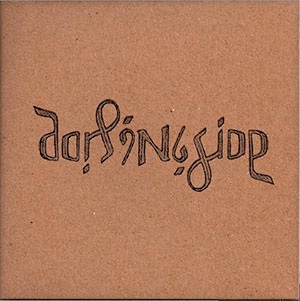
True to the band’s name, in “Good Man,” there are no easy phrases, no “darlings” in here to describe the lingering addiction and loss of and separation from a difficult woman. When she says, Good man, follow where I go / A hundred miles below, honey, her intentions are leading nowhere good.The narrator reflects at the song’s end: Maybe I could be a good man, faithful, on my knees / But you left me hard to please, honey...
For this listener, the violin-cello intro in “Surround” is the first full introduction on this album to Darlingside’s particular sound. It has a cinematic feel to it, and opens the door for a savvy film-maker to use as part of a soundtrack (or at least the film credits outro) in a story about taking an unexpected path and looking for a second chance for redemption. Tell me good things, good things / I said too much too late, and you don’t feel it / So hear me now / Give me once around / Hear me out / I surround, I surround. Dave’s pleading lead vocal essentially performs a duet with the violin-cello combo and the voices of the others slide in behind him while backing handclaps effectively increase the listener’s pulse rate.
In “The Catbird Seat,” an oft-requested song from Darlingside’s fan base, there’s a gossamer poetry in the lyrics. That, and the combination of the delicacy of the melody and the deliberate hesitancy in the vocal phrasing carries with it the sensation of heartache. The violin-cello underpinning helps to portray the sense of a disorienting haze in which the song’s protagonist, beset by melancholy, can’t appreciate his fortunate position, his “catbird seat”: Here I am now / It took some time to come around / Sometimes I think it took me down / Sometimes I think / In the catbird seat / The only trees were on my street / The only step was at my door / Into a city I stood for. It’s extremely moving.
“All That Wrong,” using some studio distortion effects, produces some of the most intense, emotionally wracked cello lines to express heartache I’ve ever heard. While the narrator acknowledges that his participation in a dissolution was his choice: How we do always go along / Apple-ing pears and so on / It’s troubling / How I make mistakes for you. In the chorus, he finally realizes it wasn’t all his fault that the relationship went south and in a wrenching cry begs for her to understand: But I wasn’t all that wrong / No, I wasn’t all that wrong. The mandolin precedes and supports the fiddle passages.
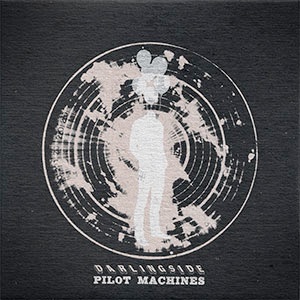
String quartet-like passages collide with an intense driving rock in “The Woods.” Perception is seen as a shifting phenomenon, changing with each new point of view: Until the leaf falls / I’ve never seen a tree / Every time I go into the woods / Before the sundown / I never know the time / Every time I go into the woods. An a cappella intro with high, almost wailing oh-oh background choral effect leads into a rapid tremolo on electric guitar and a matching beat on snare drum. A rapid fiddle passage in the second verse heightens the tension.
The symbol of a drowning man in “Drowning Elvis” serves to create an image of someone left for dead after the crash and burn of a relationship. Elvis serves as an icon who remembers: when I used to walk the surface with you. Then afterward: Dead in the water / Which only makes it harder to say / I’m a messed up cowboy Jesus / You’re the horse who gets away / And I used to walk on water with you. Don’s lead vocal is softer and there’s a wonderful harmony blend on the passage pull me under… The sonorous cello creates a mournful, lament-like undercurrent.
Early favorite, “Blow the House Down,” appears to express a common rage (expressed uncommonly well) against the elite upper strata who control society: This one goes to market / This one makes a meal at home / This one has closets / While the have-nots down the way have none. The final passages more than adequately sum it up: There’s a song for the robbers / On the other side of windowpanes … And there’s one for the lovers, and one for the sinners / That they sing in the pews / Short of distinctions / I’d say we’ve all grown tired of singing blues / Oh! Puff, puff, and blow the house down.
“When Fortune Comes” evidently explores the disappointment when a friend succumbs to an addiction: Don’t look at me for an ounce of pity / I don’t want to know when fortune comes / Cheated, borrowed, stolen, or won — same thing / The rocks all show when the river runs low. The reader may have been there — letting go of someone who has already given up on themselves: Acting like everything’s free / There’s always a cost underneath / I don’t want to know where you lost the track / Going, gone, and never came back / it’s the same thing / What’d you do with the person I knew. While there is cello accompaniment on this, it’s practically a stand-alone as an a cappella piece. The blend of cello and voice is an off-the-chart sonic edifice of perfection.
Every time I’ve seen “My Love” performed in concert, it strikes a familiar place when Harris, on lead vocal, sings: You weren’t the first to call me / an arrogant son-of-a-bitch. Especially when further reflection sets in: only out of your lips could those words pull me out of my head. A late switch in imagery completes the picture of a chastened soul: now I spend my days alone / and stay up all night / with a picture of whiskey to my left / a bottle of you to my right.
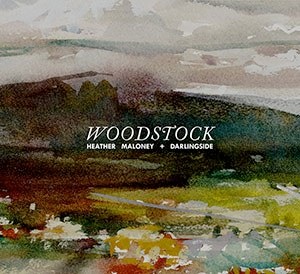
The Future Looks Bright
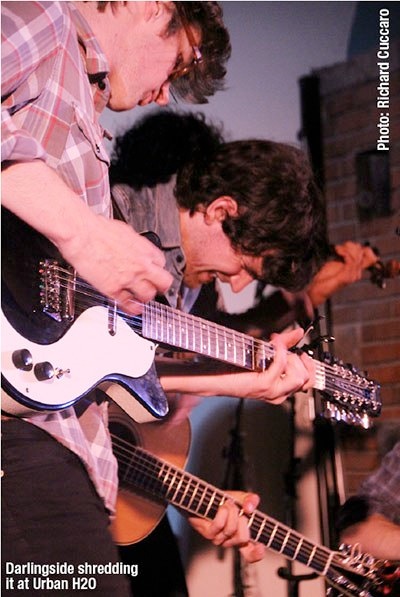
It’s exactly what I expect these guys to do.
I believe they’ll continue to thrill audiences with their vibrant melodies, meaningful lyrics and killer chops — both singing and playing — for a long, long time.
Upcoming area performances include:
Jul 9 Doylestown Summer Concert Series,Doylestown, Pa.
13 Green River Festival, Greenfield, Mass.
15 Bolton Concerts in Rogers Park, Bolton, N.Y.
18 Stone Mountain Arts Center, Brownfield, Maine, (with Heather Maloney)
Aug 1, 2 Falcon Ridge Folk Festival, Hillsdale, N.Y.
Website: www.darlingside.com

